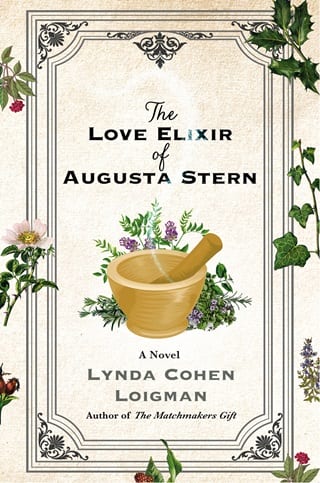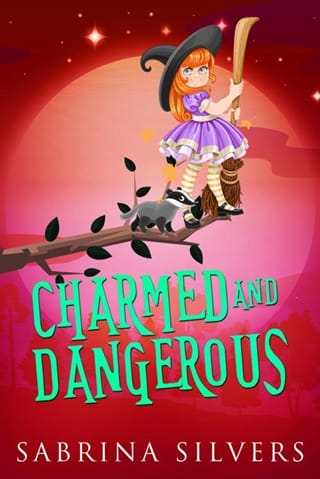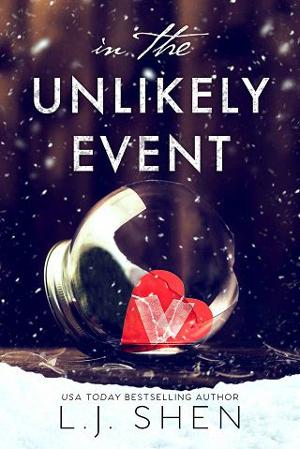Chapter Thirty
THIRTY
JANUARY 1925
Three years after her arrival in Brownsville, Esther was still pursuing her vocation. The unpleasantness with Talia Friedman did not slow her down in the slightest—in fact, it only solidified her reputation.
Meanwhile, after countless squabbles with her nephew, she had settled on an area of practice that interfered as little as possible with his trade. Of course there were sometimes exceptions, but Esther’s bread and butter became advising her neighbors on a myriad of “women’s problems”: fertility, pregnancy, the illnesses of young children, and treatments for women as they drifted slowly toward the perilous Charybdis known as the “change of life.”
It was for this last reason that Zip Diamond’s wife appeared one day at Esther’s door.
As it happened, the Diamonds lived on the same street as one of Esther’s most loyal customers—Mrs. Harriet Dornbush. It was one of the cleaner and quieter streets in the neighborhood, and even more so since Zip Diamond had moved there. No one would dare to cause a disturbance or drop a single piece of litter on the sidewalk where the notorious racketeer made his home. The trees stood taller on Zip Diamond’s block, and the flowers knew better than to droop in the heat. Even in the winter, the snow wouldn’t dream of turning to slush on his stoop.
Mrs. Dornbush paid little attention to the rumors and knew very little about the family. She had greeted Mrs. Diamond only in passing and had never spoken with her before. She was a bit surprised, therefore, when Mrs. Diamond stopped her one morning to admire her son as he slept in his stroller. “What a beautiful baby,” Mrs. Diamond sighed, rubbing her thumb against Jeremiah’s cheek. The next thing Harriet knew, Mrs. Diamond was in tears.
As the elegant lady cried into the collar of her lavish sable coat, she reminded Harriet of herself, back when the sight of the drugstore kittens had brought about a similar rush of emotions. Harriet felt a surge of pity for this woman she did not even know.
“I miss this age,” Mrs. Diamond sniffed. “My son and daughter are getting so big. They hardly need me anymore.”
“I’ve seen you walking with them,” Mrs. Dornbush admitted. “They both seem like lovely children.”
“That’s just it—they won’t be children for much longer.” Mrs. Diamond took a handkerchief from her purse and dabbed at the corners of her eyes.
Harriet couldn’t say exactly what came over her, but something about Mrs. Diamond’s tears made her feel as if she knew her. “Have you ever thought about having more?” As soon as she asked the question, however, she felt sure that she had gone too far. “Oh goodness,” she said. “I’m so sorry. I don’t even know you… I shouldn’t have asked…”
“Don’t apologize. I wish I could. I’m much too old for all that now. Too old, too withered, too muddled, too weak…” Mrs. Diamond began to cry again.
“Oh dear,” Harriet Dornbush whispered, patting the stranger on the shoulder. “Is there anything I can do?”
“No, no. Oh, how embarrassing this is. For the past few months, I’ve been an absolute mess. It’s… well… it’s what happens to us all at my age, I’m afraid. But I’ve honestly never felt worse. My heart keeps racing, and I can’t sleep at night. I wake up drowned in perspiration. I have cramps and headaches and terrible pains. I’ve been to all kinds of doctors, but they don’t seem to have any real answers.”
“Doctors!” Harriet scoffed. “I listened to doctors for seven years, but none of them did anything to help me have Jeremiah.”
Mrs. Diamond parted her lips in surprise. “I don’t understand. If the doctors didn’t help you, then who did?”
Harriet Dornbush lowered her gaze and let it rest on her precious son, the child she thought she would never have. “The most brilliant woman I’ve ever met. I’d be happy to give you her name…”
The next morning, after Augusta’s father left for the pharmacy, there was a sharp knock at their door. Augusta put down her piece of toast. “Were you expecting anyone?” she asked. But Esther shook her head and took another sip of tea.
The woman waiting in the hallway didn’t look like one of Esther’s typical customers. With her shining fur coat and styled hair, she was far more glamorous than the Brownsville housewives who usually visited to ask for advice. Augusta guessed she was in her late forties—older than Augusta’s mother would have been, and yet not so very far off. Her beauty was like the ocean in winter—cold and splendid in its austerity.
“Can I help you?” Augusta asked politely.
“Thank you, yes. I’m looking for Esther. Harriet Dornbush recommended her. I am Mrs. Mitzi Diamond.”
From inside the kitchen, Esther was listening. “Augusta, show our visitor in.”
Augusta led Mrs. Diamond to the back of the apartment, where Esther was waiting by the sink. She’d tidied up their breakfast dishes and put a clean apron on over her clothes. As always, her dress was black and shapeless, her hair tucked away under a scarf, her face completely unadorned. She looked as different from Mitzi Diamond as another woman could.
Esther gestured for Mrs. Diamond to remove her coat and take a seat. Without her fur, Mrs. Diamond was less intimidating. It was then that Augusta saw the dark circles that clung to the skin beneath her eyes. Her dress may have been expensive silk, but the body beneath was stooped over slightly, as if she were holding some kind of pain.
“Would you like tea?” Augusta offered, but Mrs. Diamond declined.
“How can I help you?” Esther asked, though Augusta was certain that her aunt already had some idea. She never stopped being surprised by Esther’s diagnostic abilities.
“Harriet Dornbush is my neighbor,” said Mrs. Diamond. “She told me that you were able to help her when none of her doctors could. She made it sound like you worked a miracle.”
Esther chuckled and smoothed her apron. “Do I look like a woman who can work miracles? No, what I do is very simple: I look, I listen, and I try to understand what it is that my customers need. Sometimes I make them a nice bowl of soup. Then I help them if I can.”
Mrs. Diamond tilted her head. “Do you think you can help me?”
“That depends,” said Esther. “Why don’t you tell me what is wrong?”
After a moment of hesitation, Mrs. Diamond’s story poured from her lips: the listlessness, the feverish episodes, the backaches, the cramps, the palpitations. Like almost every other woman her age, she’d been taking Lydia E. Pinkham’s Vegetable Compound for assorted female complaints, but the medicine had not helped to alleviate her symptoms. Augusta knew that her father had labeled Mrs. Pinkham a “quack” and that he refused to sell her tonic in his store.
Augusta saw the pity in Esther’s eyes. The two women may have been from different worlds, but there was an unmistakable bond between them—the type of bond that sometimes surfaces between those who have shared the same kind of suffering.
Esther stretched out a single calloused hand and placed it on top of Mrs. Diamond’s smooth one. “I will help you,” she said. “Come back tomorrow.”
That night, Augusta followed Esther to the kitchen, with the apothecary case in hand, but this time, Esther motioned for her niece to gather the ingredients herself. Augusta had seen her aunt make powders for women like Mrs. Diamond before. With her gift for following formulas, she already knew the recipe by heart. Having memorized the contents of Esther’s case, Augusta was able to pull and pluck all the ingredients with relative ease.
The fernlike leaves were mimosa, the dried yellow flowers were St. John’s wort, and the sand-colored root was ginseng. Augusta found black cohosh and sage, sesame seeds, and the dried pink petals that she recognized as red clover.
Outside the kitchen window, the Brownsville sky was bright with January stars. Patches of light from the flickering streetlamps fell across the back of Esther’s robe, turning the fabric from sapphire to lapis until it finally resolved in a rich indigo. As was her custom during such work, Esther let her hair hang loose over her shoulders. The strands were silver and pearl, and every shade in between. They heightened the splendor of her weathered face like thunder exaggerates a summer storm.
Esther handed the mortar and pestle carefully to Augusta. “You should say the words now,” Esther told her.
“Can I say them in English?” Augusta asked. “The Yiddish never sounds right when I say it.”
“As long as you feel the words in your heart, the language you say them in should not matter.”
“Why didn’t you tell me that before?”
Esther shrugged. “You never asked.”
Augusta took a steadying breath, shut her eyes, and tried to focus.
To ease the pain of those who suffer
To repair the bodies of those who are ill
To restore the minds of those in need
Although Augusta recited the words correctly, something in the room felt wrong. The candles flickered in their holders; the electric charge in the air had weakened.
“Say them again,” Esther told her.
To ease the pain of those who suffer
To repair the bodies of those who are ill
To restore the minds of those in need
The starlight remained on the outside of the windows. The room felt sterile and cold.
“Again,” Esther encouraged. She thumped the left side of her chest with her fist. “You must feel the words, Goldie, in here.”
This time Esther joined in her chant, transforming the words into a kind of song. Over and over, the two of them sang, until the words became a wish. The air filled suddenly with the scent of citrus—sour and sweet like lemons and honey. The candle flames swelled and swayed and brightened; starlight pushed its way into the room.
To ease the pain of those who suffer
To repair the bodies of those who are ill
To restore the minds of those in need
After the energy in the room settled, Esther flashed Augusta an enigmatic smile. She took the mortar from her niece’s hands, emptied the powder onto another muslin square, tied the bit of fabric with string, and tucked it into the pocket of her robe. Her hazel eyes sparkled in the candlelight. “You did well,” she said.
But Augusta was not convinced. “Why did it take so long to work? Did I say the words wrong?”
Esther pressed one hand against her niece’s cheek. When she spoke, her voice was low and warm. “You said them perfectly,” she said. “But the words are not like the formulas in your books or the bottles on your father’s shelves. You cannot memorize and repeat them. You must feel them in your bones.”
“But I want to be able to do this on my own. I can’t have you helping me all the time!” Augusta’s voice betrayed her frustration.
Esther tried to reassure her. “I believe you are gifted,” she said. “That is why I agreed to teach you. But you are young, and you must learn patience. I do not doubt that you will work hard, but you are still searching for the easiest answers. You still think illness can be cured with a pill or a powder and a few old words. You still think that the outcome is something you can control.”
“But isn’t that true? You do control it! I’ve seen what you do—things the doctors couldn’t, things no one can explain. You saved Irving! You gave a barren woman a child! You made Bess know she wanted to marry George!” Augusta’s eyes grew wide and wild. “Maybe… maybe if you had treated my mother, you would have been able to save her, too!” She sank down on one of the kitchen chairs and buried her face in her hands.
Esther took a step closer to her niece and placed a hand on Augusta’s shoulder. “Sometimes,” she whispered, “I am able to help. But other times, I cannot. There were many people back in my village for whom I could offer no cure. There were times when my powders and my elixirs did more harm than good. You and I have not known each other long. You have seen only my most fortunate outcomes. But do not mistake a few successes for an unblemished past.”
Augusta’s tears fell freely now. “But could you have healed my mother, Aunt Esther? Please, tell me the truth.”
Esther shook her head. “No,” she said sadly. “I tell you this honestly. Her illness was nothing I could have cured. There was a man in my village who died of the same sickness. A child died, too, and I could not help her. The world we inhabit is not always kind.”
“But you said… you told me that words could heal!”
“Sometimes yes, sometimes no. Sometimes, no matter the powders or words, a person’s time on this earth must end. There is no magic any of us have that can make someone live forever.”
“Then what is the point? Why do this at all?”
“Because there is still good that we can do. Because sometimes our remedies can cure. Because we can bear witness to a woman who suffers when her doctors refuse to see her pain. Because even when we cannot heal, a bowl of chicken soup can offer comfort.”
Augusta wiped the tears from her eyes. She was still too young to understand all the subtleties of her great-aunt’s message, but she could comprehend enough to know what she still wanted for her future. “I want to learn from you,” she told Esther. “I want to learn everything you can teach me.”
Esther nodded. “I will teach you, but we must progress slowly and with the greatest care. I do not want you to make my mistakes. You have opportunities that I did not have, Goldie. You must make the most of them.”
 Fullepub
Fullepub 



